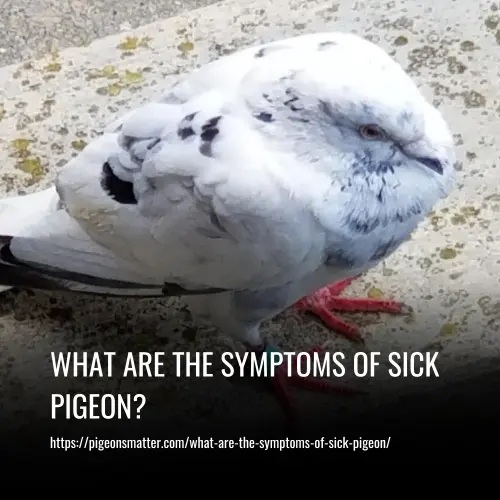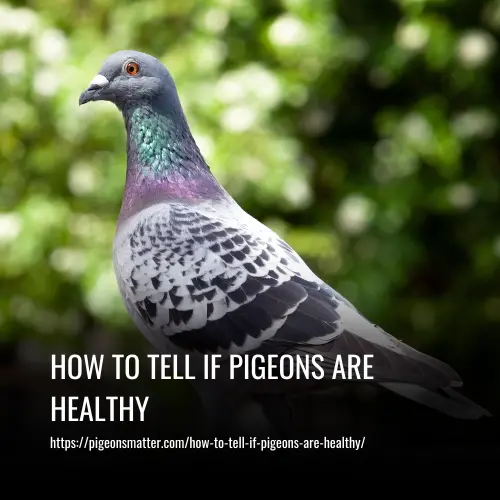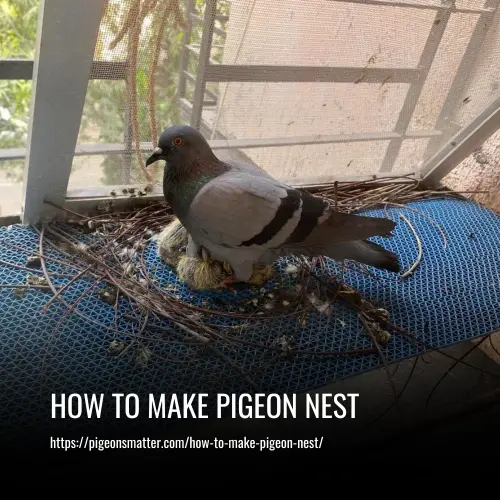Sick pigeons can exhibit a variety of symptoms that may indicate illness or injury. Being able to recognize these symptoms is crucial in order to provide proper care and treatment for the bird.
Here Are Some Symptoms Of A Sick Pigeon:
- Loss of Appetite
- Laziness
- Loose Motion
- Vomiting
- Neck Twisting
- Eye Infection
- Marasmus
- General Body Weakness
- Excessive Wetness, Hardness, or Odor in Discharge
- Drooped Wings
- Changes in Dropping Color
- Changes in Feather Appearance
- Feet Abnormalities
- Respiratory Problems
- Changes in Eating Habits
- Standing Away from Other Pigeons
- Hunched Posture
- No Interest in Flying or Inability to Fly
- Walking in Circles or Backward
- Fits
- Walking on the Wings
- Throwing Seeds into the Air
- Depression
- Loss of Weight

The Symptoms of Sick Pigeon
It’s important for pigeon owners to be aware of the signs that indicate a sick or unhappy pigeon. Recognizing these signs can help you take the necessary steps to address the issue and ensure your pigeon’s well-being.
1. Loss of Appetite
Pigeons are typically active creatures and have a healthy appetite. If you notice that your pigeon is not eating as much or has completely lost its appetite, it may be suffering from a disease or illness. Consult a pigeon expert or vet for a proper diagnosis and treatment.
2. Laziness
Lack of energy or laziness is often a clear sign that your pigeon is sick. If you observe your pigeon appearing sleepy or having its neck touching its body due to laziness, it is likely experiencing illness. Prompt action should be taken to address the underlying issues.
3. Loose Motion
Pigeon droppings should neither be solid nor liquid. If you notice that your pigeon is experiencing loose motion or diarrhea, it is crucial to consult a vet or pigeon expert. This symptom should not be taken lightly, as it can lead to weight loss and further health complications if left untreated.
4. Vomiting
Vomiting is not a normal behavior in healthy pigeons. If you witness your pigeon vomiting, it is a clear indication that it is unwell. Possible causes of vomiting in pigeons include digestive issues, cold weather, or a weakened immune system. Monitoring your pigeons closely can help identify this symptom.
5. Neck Twisting
Neck twisting is a condition that affects the neck muscles, causing them to tighten and twist. While the exact causes of neck twisting are unknown, consulting a vet or pigeon expert is recommended for diagnosis and treatment.
6. Eye Infection
Eye infections are common in pigeons, often characterized by swollen eyes and the presence of pimples. Pigeons can contract eye infections through flying or interacting with other pigeons. Prompt treatment is essential to prevent further complications. Consult a vet for medication prescribed specifically for eye infections in pigeons.
7. Marasmus
Marasmus, also known as Sokra in some countries, is a disease that weakens pigeons and leads to weight loss. If you notice that your pigeon is progressively losing weight and becoming weaker, it is vital to consult a vet for a proper examination and diagnosis. Timely intervention can prevent further deterioration and potential fatality.
8. General Body Weakness
Birds that display general body weakness will have difficulty walking and may fall frequently. This symptom can be a late-stage characteristic of a disease. It is advisable to consult a veterinarian if your pigeons exhibit this sign.
9. Excessive Wetness, Hardness, or Odor in Discharge
If you observe extremely wet, hard, or foul-smelling droppings in your pigeons, it may indicate a disease. Constipation, which is uncommon in birds, can result in hardened droppings. Regularly cleaning the pigeon house will help identify this symptom.
10. Drooped Wings
Drooping wings and apparent weakness or immobility are common signs of various bird illnesses. If your pigeons exhibit these signs, it is recommended to seek professional veterinary assistance.
11. Changes in Dropping Color
Although normal pigeon droppings are typically white, variations can occur depending on their diet. However, colors like green or black, as well as the presence of blood, can indicate illness.
12. Changes in Feather Appearance
Observable changes in feather appearance, such as dullness, abnormal barring, excessive feather loss, misshapen feathers, matting (especially on the head), or bald spots, can signal illness.
13. Feet Abnormalities
Abnormalities in a pigeon’s feet can include shifting feet, abnormal nail growth, swollen joints and feet, and lameness. These signs should be taken seriously and addressed promptly.
14. Respiratory Problems
Respiratory issues, although not as prominent in birds as in mammals, can still affect pigeons. Common respiratory problems include breathing difficulties that may resemble snoring. Professional veterinary assistance is recommended in such cases.
15. Changes in Eating Habits
Changes in eating habits, such as vomiting, loss of appetite, discharge from the mouth, or swellings in the crop area, can indicate illness. Prompt veterinary care should be sought to address these symptoms and ensure the bird’s well-being.
16. Standing Away from Other Pigeons
If you notice a pigeon consistently standing away from the rest of the flock, it could be a sign of illness or discomfort. Pigeons are social animals and tend to stay close to each other, so this behavior may indicate that the pigeon is not feeling well.
17. Hunched Posture
A pigeon with a hunched posture may be in pain or experiencing discomfort. This can be a sign of illness or injury. If you notice a pigeon consistently hunching its body, it’s important to monitor its behavior and consider seeking veterinary attention if necessary.
18. No Interest in Flying or Inability to Fly
Pigeons are natural fliers, so if you notice a pigeon showing no interest in flying or having difficulty flying, it may indicate an underlying issue. This could be due to injury, illness, or weakness. It’s important to observe the pigeon closely and consult a veterinarian if needed.
19. Walking in Circles or Backward
Abnormal walking patterns, such as walking in circles or backward, can be a sign of neurological problems or injury. This behavior should be taken seriously and veterinary care should be sought to ensure the pigeon’s well-being.
20. Fits
If a pigeon is experiencing fits or seizures, it is a serious medical emergency. Fits can be caused by various factors, including diseases, toxin exposure, or neurological problems. Immediate veterinary attention is crucial in such cases.
21. Walking on the Wings
If you notice your pigeon walking on its wings instead of its legs, it may be a sign of illness. This can indicate weakness, pain, or discomfort in the legs or feet. It’s important to seek veterinary care to determine the cause and provide appropriate treatment.
22. Throwing Seeds into the Air
Pigeons naturally eat by picking up seeds from the ground or a feeding tray. If you observe your pigeon repeatedly throwing seeds into the air without eating them, it could be a sign of digestive issues or oral discomfort. A veterinary evaluation may be necessary to diagnose and treat any underlying conditions.
23. Depression
Depression in pigeons can manifest as a lack of energy, decreased activity, and reduced interest in their surroundings. They may appear fluffed up, unresponsive, or spend more time sitting or sleeping. This could be a sign of physical illness or a response to changes in the environment. Consulting with a veterinarian can help determine the cause and provide appropriate care.
24. Loss of Weight
Ill pigeons often struggle to eat enough or properly digest their food, resulting in weight loss. These birds may appear thin, with ruffled feathers and a lack of healthy sheen. Identifying and addressing the underlying causes of weight loss is crucial for the bird’s recovery.
Owner’s Responsibilities
As a pigeon owner, it is your responsibility to ensure the health and well-being of your birds. This includes providing daily care and being able to recognize signs of illness that may require medical attention. It is important to be familiar with these signs in order to take appropriate action.
Fortunately, identifying potential sickness in pigeons is generally not difficult, and you should be able to notice if your birds are not feeling well. Use this guide as a resource to help you identify potential sickness in your pigeons and understand what steps you should take in response.
Examining a Sick Pigeon
If you notice any signs or symptoms of illness or injury in your pigeon, it is crucial to provide proper medical care. Rest and calm down your pigeon before attempting to examine it. Once it has calmed down, follow these steps to thoroughly examine your pigeon:
1. Check for Bite Wounds
Carefully inspect the entire body of the pigeon, as bite wounds from other animals may be hidden under the feathers. Look for any signs of bites, such as puncture wounds or areas of missing feathers.
2. Look for Other Injuries
Examine the pigeon for cuts, abrasions, or broken bones. Pay attention to any scabs, lesions, or visible injuries. Sometimes, the symptoms of an injured bird can mimic those of an illness, so it’s crucial to rule out any physical injuries.
3. Examine the Beak and Mouth
Gently open the pigeon’s beak and inspect its mouth and throat. If you notice white or cheesy lumps, it may indicate canker or pigeon pox. These conditions should be addressed by a veterinarian.
4. Check for Eye and Nose Discharge
Look for any discharge from the pigeon’s eyes and nose. If you observe discharge accompanied by sneezing or breathing difficulties, it’s important to consult a veterinarian for further evaluation and treatment.
5. Analyze the Pigeon’s Droppings
Although it may not be a pleasant task, examining the pigeon’s droppings can provide valuable insights into its health. Watery or green droppings may indicate coccidiosis, while green droppings with extreme weight loss could suggest malnutrition or starvation.
6. Look for Swelling
Check for any swelling in the pigeon’s joints or other areas of its body. Swelling often signifies an underlying problem, such as paratyphoid. If you notice any swelling, it’s crucial to seek veterinary care for a proper diagnosis and treatment.
7. Monitor Behavior Changes
Changes in behavior can be significant indicators of illness in pigeons. For example, neck torsion could be a sign of paramyxovirus. If you observe any unusual behavior or symptoms, it’s important to seek professional medical attention for your pigeon.
Remember that seeking prompt veterinary care is vital for any signs or symptoms of illness or injury in your pigeon. Early treatment increases the chances of a positive outcome and prevents unnecessary suffering for your bird.
Caring for a Sick Pigeon
Taking proper precautions when handling a sick or injured pigeon is important for both the bird’s health and your own. Here are some guidelines to follow:
1. Wear Gloves and Wash Your Hands
Always wear gloves when handling a sick pigeon and wash your hands thoroughly with warm, soapy water afterward. This helps to prevent the spread of any potential illnesses to both yourself and other birds in your flock.
2. Isolate the Sick Pigeon
To minimize the risk of spreading the illness, keep the sick pigeon separate from other birds. This will also allow you to monitor the bird’s condition closely.
3. Monitor the Temperature
Ensure that the sick pigeon is kept at an appropriate temperature. It should not be too hot or too cold, as extreme temperatures can further weaken the bird’s immune system.
4. Be Cautious with Food and Water
Avoid forcing the pigeon to eat or drink. Forcing them can result in choking, which can be fatal. If the bird refuses to eat or drink, seek assistance from a veterinarian.
5. Don’t Attempt to Remove Growths
If the pigeon has growths in its mouth, never try to remove them yourself. This can cause bleeding and potentially lead to suffocation. Instead, consult with a veterinarian for proper treatment.
By following these precautions, you can help ensure the well-being of the sick pigeon and prevent the spread of any potential illnesses.
FAQs
If a pigeon is sick, you can give it some water to rehydrate it. The bird may be dehydrated if it has been on the ground for a while. You can also add a pinch of sugar and salt to help replenish its electrolytes. Once the bird seems calm, check for any visible injuries like a drooping wing, bleeding, or limping.
The most common disease in pigeons is histoplasmosis, which is a fungal infection that thrives in damp areas, particularly those with organic material like pigeon or bat droppings. The spores of this disease are very lightweight, making it easy for them to be spread through the air.
When pigeons are sick, you can feed them a diet of pigeon feed, which is made up of grains like corn, wheat, and peas. You can also give them small portions of fresh fruits and vegetables like grapes, peas, and lettuce. Just make sure that the food is fresh and doesn’t have any mold or contaminants.
To improve pigeon health, it is important to maintain proper hygiene. Clean the cage or loft daily and provide fresh straw or wood shavings as floor covering. Clean the feed and water containers regularly and provide fresh water and food twice a day. Sterilize the containers regularly to prevent the spread of bacteria or disease.
Respiratory infections in pigeons can be caused by various factors such as fungi, viruses, bacteria, and mites. These infections can affect different parts of the respiratory system including the lungs, air sacs, sinuses, and other respiratory organs.
If your sick pigeon is not eating, it may be due to illness or stress. It’s important to keep the bird safe and confined in a warm and quiet environment. You can try to encourage or assist the bird to drink and eat. It’s recommended to seek guidance from an expert to properly care for the bird in this state.
The most common cause of pigeon death is disease. Pigeons are prone to various diseases and can act as carriers for them. As pigeons age, their immune system weakens, along with their agility, sensory, and digestive systems, which can lead to sudden death. It is important to ensure proper care and hygiene for pigeons to prevent disease and prolong their lifespan.
The most commonly used antibiotic for pigeons is Doxycycline, which is available as a prescription medication. Another over-the-counter option is Chlortetracycline and Oxytetracycline. Doxybiotic is a popular choice as it also contains additional Vitamin A and other ingredients to aid in recovery.
Conclusion
In conclusion, knowing the symptoms of a sick pigeon is crucial for both their well-being and the safety of those around them. From changes in behavior to physical signs, it’s important to be vigilant and seek professional help if needed.
By keeping a close eye on our feathered friends and providing them with the care they deserve, we can ensure their health and happiness. So, let’s be proactive and keep those pigeons soaring high!


